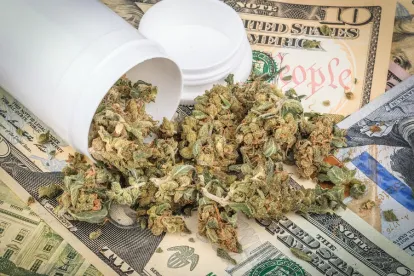In a single-page memorandum issued today, Attorney General Sessions tersely rescinded a string of DOJ enforcement policies announced during the Obama Administration — chief among them the “Cole Memo,” described below — which collectively had indicated that although marijuana was still illegal under federal drug laws and the DOJ would continue its enforcement of those laws, the DOJ also would defer to state governments that had developed regulatory regimes legalizing marijuana under defined circumstances. Although Attorney General Sessions is well known for his personal distaste for marijuana-related activity, he previously had not been entirely clear as to exactly what position his DOJ would take in regards to the Cole Memo and related enforcement.
Although this policy change has many potential implications, its primary relevance to Anti-Money Laundering (“AML”), the Bank Secrecy Act (“BSA”), and money laundering issues is that the Cole Memo had provided the support for the federal government to issue guidance that, under very defined circumstances, financial institutions could provide services to state-licensed marijuana businesses.
As we have blogged, the Cole Memo was a non-binding policy memorandum issued by former Deputy Attorney General James M. Cole on August 29, 2013, that described the DOJ’s enforcement priorities “in light of the trend of state ballot initiatives” legalizing medical and recreational marijuana possession and creating regulatory schemes for its sale, production, and processing. The Cole Memo explained eight enforcement priorities which sought to guide federal prosecutorial decisions regarding marijuana-related activity. The Cole Memo did not “legalize” marijuana activity but it did pave the way for States to take their own approaches regarding the marijuana industry, relatively safe in the assumption that actual federal enforcement would be rare or non-existent in situations that otherwise satisfied State law. Indeed, the recent California ballot initiative which legalized the recreational use of marijuana just took effect on January 1st — only to be met with the new DOJ policy four days later.
As noted, for the purposes of AML, the BSA and the federal money laundering statutes, the primary relevance of the Cole Memo’s demise is that the memo had provided the support for the federal government to issue guidance that, under very defined circumstances, financial institutions could provide services to state-licensed marijuana businesses. Specifically, and soon after the Cole Memo was issued, the Financial Crimes Enforcement Network (“FinCEN”) issued a memorandum in February 2014 entitled “BSA Expectations Regarding Marijuana-Related Businesses” (the “FinCEN Memo”). This guidance was issued to clarify how financial institutions could provide services to marijuana-related businesses consistent with their BSA obligations. Citing the Cole Memo, the FinCEN Memo in part (i) provided a checklist of the “customer due diligence” that financial institutions should follow to assess the risk of providing services to such businesses; (ii) provided guidance on which of three types of Suspicious Activity Reports, or SARs, should be filed for marijuana-related activity; and (iii) provided a non-exhaustive list of “red flag” scenarios that possibly implicated a Cole Memo enforcement priority or a violation of state law by a marijuana-related business.
Although the FinCEN Memo did not provide blanket authorization to financial institutions to do business with the marijuana industry, it did provide a road map – however difficult, opaque and risky – regarding how to do such business and potentially remain in good stead with regulators. The FinCEN Memo had a practical effect: even though many financial institutions still refused to do business with the marijuana industry given the inherent AML and BSA risks, some became willing to do so, as reflected by a 2017 report by FinCEN which reflected that the (small) number of depository institutions actively providing banking services for marijuana-related businesses had increased from January 2016 to March 2017.
However, and as we also have blogged, the Cole Memo hardly opened the floodgates of traditional banking services for the marijuana industry: the practical effect of the Cole Memo and the FinCEN Memo were limited by the real-world consequences of “de-risking” activity by financial institutions, and the recognition by the federal courts that marijuana-related activity still violated federal anti-drug laws (and therefore the federal money laundering statutes as well), regardless of any State laws legalizing certain marijuana-related activity.
But, the fact remains that a string of DOJ policy announcements had been trending towards the liberalization of enforcement decisions, and today’s announcement undoes all of them. The “Sessions Memo” is only a single page, and we simply reproduce it here:

Note that the memo’s reference to 31 U.S.C. § 5318 is to the specific provision of the BSA which requires financial institutions to create and maintain sufficient AML policies and procedures.
As this announcement obviously reflects, enforcement policies change over time and with new executive administrations. Thus, it is entirely possible that a future administration will return to a version of the Obama Administration’s approach to the marijuana industry and related enforcement — or perhaps will adopt an even more permissive posture, given polling which appears to reflect that an increasing portion of the U.S. population is embracing or becoming more tolerant of marijuana growth and use. For example, an October 2017 Gallup poll reported that 64 percent of Americans support legalizing marijuana for both recreational and medical use — which is the most positive response to a Gallup question regarding the legalization of marijuana since Gallup began asking the question in 1969, when only 12 percent of those polled answered that they supported legalization. Indeed, even some Republican lawmakers have reacted negatively to this announcement by DOJ.
Nonetheless, while it remains the stated policy of the DOJ, what is clear about today’s announcement is that financial institutions facing regulatory scrutiny under the BSA regarding the strength of their AML policies now have no incentive to even try to walk the tight rope of the Cole Memo and prior FinCEN pronouncements and accept the proceeds of marijuana sales. Under the “Sessions Memo,” marijuana activity will be treated as criminal activity, and its proceeds will be regarded as the proceeds of “Specified Unlawful Activity,” or “SUA” — more colloquially known as dirty money. In the eyes of current DOJ policy, transacting in such proceeds constitutes money laundering, in violation of Title 18, as well as a violation of a financial institution’s AML policy under the BSA.




 />i
/>i

